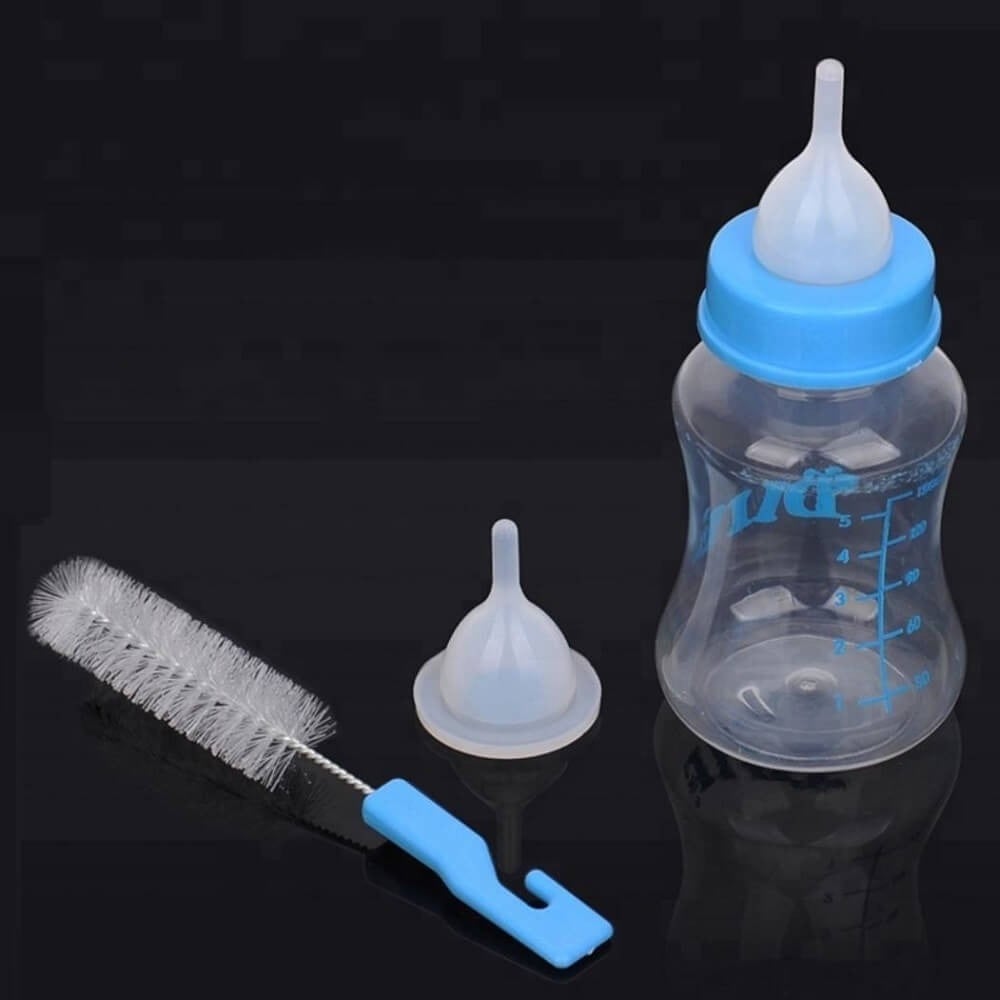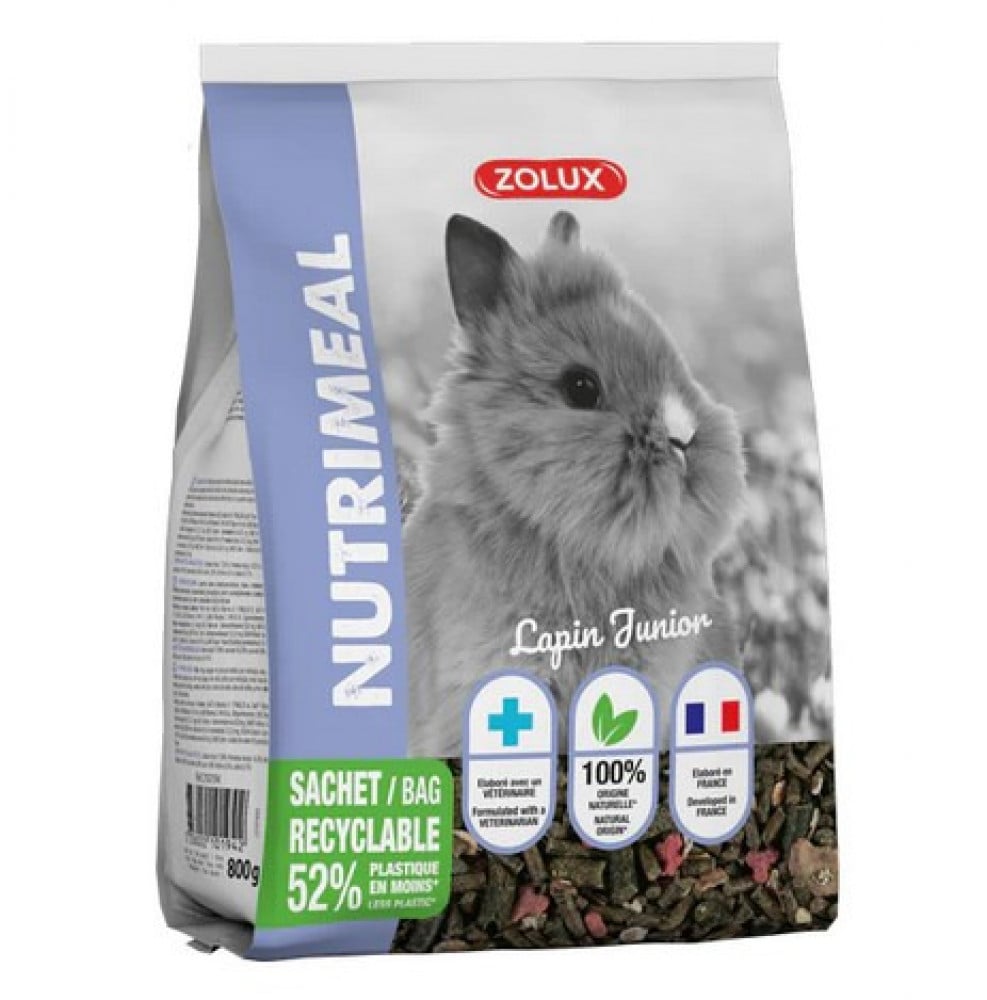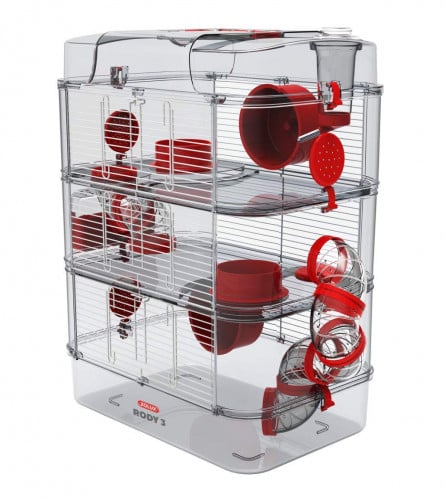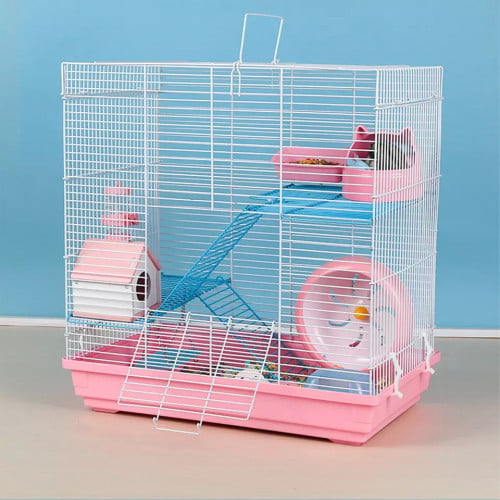
Many people bring home a rabbit when it is still just a baby rabbit. But most of the information you find about rabbit care and health is geared toward adult rabbits. You may find information on how to keep an adult rabbit on a healthy diet very useful, but what about your new baby rabbit? Young rabbits have special nutritional needs that differ from their adult counterparts. So in this guide we explain to you everything you need to know about eating small rabbits and how to feed them the appropriate diet for them.
What do baby rabbits eat?
Here's the right way to feed baby rabbits a balanced diet:
1. Baby rabbits (less than 8 weeks old)
Baby rabbits should not be separated from their mothers until they are more than two months old. This helps ensure that baby rabbits have developed a fully functioning immune system by digesting their mother's milk. Therefore, they should never be separated before the age of two months due to the danger this poses to them. These little rabbits need a high concentration of fat and protein found in their mother's milk so that they can grow big and strong. The baby rabbit also depends on the antibodies it receives from its mother's milk to protect it from infections and diseases since it does not have a fully functioning immune system yet.
Once the baby rabbit is about 3 or 4 weeks old, he will begin to explore a bit around the nest area. At this point, it would be a good idea to start introducing solid foods into their diet. You can provide some alfalfa hulls and alfalfa pellets for him to eat, but his main food source will still be his mother's milk.
2. Age 7 to 8 weeks
When baby rabbits reach 7 to 8 weeks of age, the amount of dry pellets and hay should be increased so that they have some to eat all the time. However, they still have to have access to their mother during this time so they can drink milk. Their digestive systems also begin to function properly. You should also make sure that the rabbits have access to fresh water when they are weaned from their mother's milk.
3. Small orphan rabbits
If you have orphaned or abandoned rabbits that cannot drink their mother's milk, do not replace them with cow's milk. There are no direct substitutes you can buy for rabbit milk, so the best alternatives you can use are cat milk or goat milk. Puppy milk replacer is also an option if you can't find the above two options. Fortunately, at Petaholic, we offer kitten milk and puppy milk as well. In these cases, you will have to try syringe feeding the baby rabbits so that they can drink on their own. You will need to syringe feed them twice a day. The recommended daily ration for feeding baby rabbits by syringe is as follows:
- Neonates: 2.5 ml twice a day.
- Age 1 week: 6 to 7 ml twice a day.
- Two weeks: 12 to 13 ml twice a day.
- 3 to 6 weeks: 15 ml twice a day.
Diet for young rabbits aged 2 to 6 months
Once the baby rabbit is two months old, it should be separated from its mother and put on a diet of all solid foods. However, they will still have a diet inferior to that of adult rabbits. These bunnies are still growing a lot! They therefore need more protein and calcium in their diets to ensure that they grow up to be healthy, sound and strong rabbits.
To help you feed your baby rabbits, we have provided you with:
Shop the product here with Petaholic, your first pet friend

What foods are suitable for small rabbits that provide them with all their nutritional needs?
Here are the best foods for small rabbits:
1. Alfalfa straw
Unlike adult rabbits, which should receive mostly timothy hay, young rabbits should receive alfalfa hay. Alfalfa hay, the best food for young rabbits, contains a much higher amount of protein and calcium, making it ideal for a growing rabbit. You'll want to make sure your rabbit has an unlimited supply of alfalfa hay, so he will always have something to chew on. This hay should be a large part of your rabbit's diet because it promotes good digestion and healthy teeth. It won't make up as much of the diet as it does for adult rabbits, but you still want to make sure your baby rabbit is chewing hay every day. Fortunately, alfalfa hay tends to be tasty for young rabbits, making it more likely they will nibble on it. It is also sweeter and softer than timothy hay for adult rabbits. Therefore, young rabbits are usually happy to nibble on it.
2. Pellets
Pellets are very important in the diet of young rabbits. This rabbit food contains higher levels of protein, nutrients and calcium than hay and is made to help rabbits gain weight. Young rabbits should be given alfalfa pellet mix as it will promote healthy growth of the young rabbits. You want to make sure you give your little rabbit a healthy type of pellets. Therefore, stay away from any mixture that contains a lot of colored pieces, pieces of fruits or vegetables, dried seeds, or sugar, as they are harmful to the rabbit’s digestive system.
Instead, choose a bag containing plain brown granules. Check the ingredients to make sure alfalfa grass is the #1 ingredient on the list. If your baby rabbit ignores hay and only eats pellets, limit pellets to about 1/2 cup per day for every pound of your rabbit's weight.
3. Leafy vegetables
When your rabbit is about 3 months old, you can start introducing some leafy greens into his diet. Introduce it slowly, offering only one type at a time. This will help ensure that nothing causes an imbalance in the rabbit's digestion. The first time you give your rabbit new leafy greens, you should only give him a small amount to introduce the new food. Give him only 2 to 3 sprigs of parsley, for example. Over the next couple of days, you can increase the amount you give your rabbit as his digestion gets used to the new food. After giving one type for a week, you can offer another type. Even as your rabbit grows into an adult, you will want to introduce new foods slowly.
4. Rewards
It is best to avoid giving baby rabbits any treats for the time being. Their digestion is still developing at this time and can easily be unbalanced by the introduction of high-sugar foods. These sweet foods that you should avoid feeding baby rabbits are foods that are typically considered healthy for humans. Fruits such as berries, bananas, and apples are high in sugar for rabbits. Also vegetables such as carrots, tomatoes and peppers. This means that you should not give your rabbit too many fruits and vegetables during this stage of its life. Sweet human foods, such as candy and biscuits, should never be given to rabbits.
Food for small rabbits - Zolux Nutrimil 3 - 800g
Shop the product here with Petaholic, your first pet friend

Thus, you know how to deal with these small, delicate and sensitive creatures in terms of providing food for small rabbits from the beginning of their lives, to obtain large, healthy and healthy adult rabbits. In order to ensure this, we at Petaholic have provided the finest foods for young and adult rabbits that provide all of them with the necessary nutritional needs on a daily basis.
What do baby rabbits eat?
Nutrition for young rabbits is important to ensure their proper growth and development. In the first months of their lives, baby rabbits depend on their mother's milk, but over time, solid foods need to be gradually introduced. Here are some tips on what baby rabbits should eat:
1. Breast milk:
- During the first weeks of a young rabbit’s life, he is completely dependent on his mother’s milk. It is preferable for a baby rabbit to remain on mother's milk for 6 to 8 weeks.
2. Feed for small rabbits:
- Specialized feed can be provided to young rabbits at an early age, containing balanced nutritional components such as fibre, protein, vitamins and minerals.
3. Leafy vegetables:
Fresh leafy vegetables can be served daily. These vegetables include spinach, kale, blueberries, and carrot leaves.
4. Fresh grass:
Fresh grass can be an important part of a young rabbit's diet. The grass contains fiber and important nutrients.
5. Fruits:
Fruits can be introduced in small quantities as part of the diet, such as citrus fruits, apples and bananas.
6. Water:
- There should always be access to clean, fresh water.
Hamster cage and house - Zolux Rudy-3, three-level cage
Shop the product here with Petaholic, your first pet friend

What does a rabbit eat at home?
Caring for rabbits at home requires providing a balanced and healthy diet to ensure their well-being and proper growth. Ready-made food designed specifically for rabbits can be provided, containing balanced proportions of protein, fiber and vitamins. Dry herbs and leafy vegetables can also be included in her diet to boost fiber and improve digestion. Moderate amounts of fruits, seeds and grains should be offered to provide variety. Fresh grass is an important source of fiber and natural nutrients, and it is best to make it available to your rabbit when possible. And of course, there should always be access to clean, fresh water. This diet combines balance and variety to ensure the health and happiness of your rabbit at home.
What is rabbits' favorite food?
Rabbits are herbivores, and the main part of their diet consists of grasses and fresh grass. Here are some of rabbits' favorite foods:
1. Fresh grass and herbs:
Fresh grass such as almond grass, cloves, and green legumes are among the rabbits’ favorite foods. Fresh grass can be served in moderation to provide natural fiber and nutrients.
2. Leafy vegetables:
Spinach, kale, blue chips, carrots, and lettuce are excellent choices to give to rabbits.
3. Fruit:
- Fruits such as apples and citrus fruits in moderate quantities are considered delicious for rabbits. Fruits should be served varied and in moderation to avoid excess sugar.
4. Dry feed:
- Feeds specially designed for rabbits contain protein, fiber and essential vitamins. They can be an essential part of a healthy diet.
5. Seeds and grains:
- Small amounts of seeds and grains can be offered as an additional source of energy and nutrition.
Hamster house - pink hamster cage
Shop the product here with Petaholic, your first pet friend

How many times does a rabbit eat a day?
The amount of food a rabbit eats per day depends on several factors, including the rabbit’s normal size, age, activity level, and health condition. Dry grasses and feeds specially formulated for rabbits constitute the staple food that must be provided in sufficient quantities to meet their nutritional needs. Meal size depends on the rabbit's weight, but on average rabbits consume about 25 grams to 50 grams of feed per day for every kilogram of their weight. In addition, small amounts of vegetables and fruits can be offered daily, preferably as a small part of the diet. Constant access to clean, fresh water should also be provided. It is recommended to divide meals into small meals throughout the day to ensure proper distribution of food. It is advisable to consult a veterinarian to determine the rabbit's individual needs and adjust the amount of food accordingly.
You may also be interested in:

